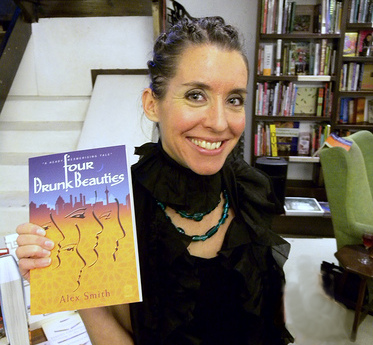The following tips by writer Veselina Yaneva will help you add colour to your writing with anecdotes.
One of the most effective techniques writers practise is to ‘show not tell’. A great way to demonstrate your idea instead of telling readers what to think is to incorporate short narratives about people and events that illustrate a point, also known as anecdotes, in your writing.
The following tips will help you make your writing more persuasive by using anecdotes effectively:
Make your writing memorable through anecdotes
According to cognitive psychologist Jerome Bruner, people are 22 times more likely to remember a fact when it has been wrapped in a story.
In their book Rework (Crown Business, 2010), Jason Fried and David Heinemeier Hansson use the power of narrative to support their opinions. For instance, they use the following anecdote to back up their business advice to ‘Make tiny decisions’:
Polar explorer Ben Saunders said that during his solo North pole expedition (thirty-one marathons back-to-back, seventy-two days alone), the ‘huge decision’ was often so horrifically overwhelming to contemplate that his day-to-day decision-making rarely extended beyond ‘getting to that bit of ice a few yards in front of me.’
The authors conclude: ‘Attainable goals like that are the best ones to have — ones you can actually accomplish and build on.’
The anecdote above is used as a strong metaphor. By comparing the abstract concept of a business journey to a physical journey, the authors help the readers see, feel and understand the importance of taking ‘one step at a time’.
Readers will more likely remember this lesson, because they have ‘experienced’ the difficulty of the expedition.
As Rudyard Kipling pointed out in The Collected Works (Ams PR, 1941), ‘If history were taught in the form of stories, it would never be forgotten.’
Evoke emotions and make your story thought-provoking
Hannah Arendt says, ‘Storytelling reveals meaning without committing the error of defining it.’
Indeed, have you noticed how people don’t like to be pushed? Instead, they prefer to be pulled, attracted and given the freedom of choice.
For example, best-selling author Peter Bregman starts the article, ‘The High Cost of Conformity, and How to Avoid it’ for Harvard Business Review (October 2015) with the following anecdote:
I was biking with my friends Eric and Adam, both far more skilled and experienced mountain bikers than I, on terrain that was slightly beyond my own skill. I thought I could do it.
I was wrong.
I suffered a pretty dramatic crash, falling down a ravine, flipping over a few times, and hitting my (helmeted) head on a tree. Eventually, I ended up in the emergency room. But not before riding another hour.
Everything turned out fine, but continuing after my crash was a poor decision. Not only was I riding injured, but, because I was tight with fear, I fell many more times.
Why didn’t I stop? I wish I could say it was bravery but, the truth is, it was nothing of the kind. I kept riding, quite simply, because Eric and Adam kept riding.
Did you imagine the accident and experience it with the author? Did you feel empathy with him and regret the decision of ‘going with the flock’?
It is only after readers have inferred the moral of this story that the author uses his biking experience to explain the abstract threats of conformity in society.
As Bregman’s anecdote shows, incorporating stories in your writing lets people draw their own conclusion. It also lets them feel right from wrong.
Use storytelling as a pull strategy.
Make your narrative personal
Unlike statistics, stories have the power to build connections between writers and readers.
With this in mind, which of the following article openings for a piece about school uniforms do you prefer?
- Statistics show that when uniforms aren’t prescribed, adolescents spend too much time in the morning trying to decide what to wear for school.
- My high school had no set uniform. I would feel very nervous every morning trying to decide what to wear.
If your answer is ‘b’, you can feel how a personal story draws the reader in.
Similarly, how would you prefer to start an article about the benefits of having a pet?
a) Statistics show that 69 million households in our country own a dog.
b) When I was a child, my fluffy white Maltese dog was my best friend. My childhood was better because of him.
Again, the answer ‘b’ shows how shared personal experience makes writing more impactful and credible. Furthermore, it creates compassion for the author’s point of view.
‘Stories create experience,’ says writing coach, Roy Peter Clark.
Make sure your readers can relate to your anecdotes
To strike a chord with your readers, you need to consider their personalities.
What are their interests and the problems they face? Understand their fears and ambitions.
Will they be influenced by famous people’s stories? If so, who are the celebrities they find inspirational?
Get to know your audience, and show them you share a common ground through the people that you choose for your anecdotes.

Include relevant anecdotes in your writing
The stories incorporated in your text must relate to the subject matter discussed.
To choose a fitting anecdote, always remember why you are using it. Its purpose should be to deepen your readers’ understanding of a particular idea. Therefore, you should decide on the lesson you want to teach in advance.
For example, if your text is about gossiping, choose your angle and your point of view first. If the lesson you want to impart is that gossiping is counterproductive, a real-life story about the harm caused by gossip would be an appropriate illustration.
Begin with the end goal in mind.
Be concise
Finally, don’t forget the definition of the word anecdote: ‘a short account of a particular incident or event, especially of an interesting or amusing nature’ (according to Dictionary.com). Remember, you are using a story to support a point. An anecdote, therefore, should be brief, lest your audience gets distracted.
Implementing these five tips can help you enliven your writing by using anecdotes.
About the Author

Veselina Yaneva is a freelance journalist with a Master’s degree in English literature from Canterbury Christ Church University, UK. Her interest in writing inspired her to embark on the Freelance Journalism for Magazines and Webzines Course at the UK Writers College. After completing this course with distinction, she’s been relishing the opportunity to immerse herself in the inspiring world of website publication as a journalism intern at the Writers College Times. Veselina’s education, voracious appetite for travel and genuine love for reading, bring a range of perspectives and ideas to her work.
You can connect with Veselina via: www.linkedin.com/in/veselina-yaneva-83213b210













